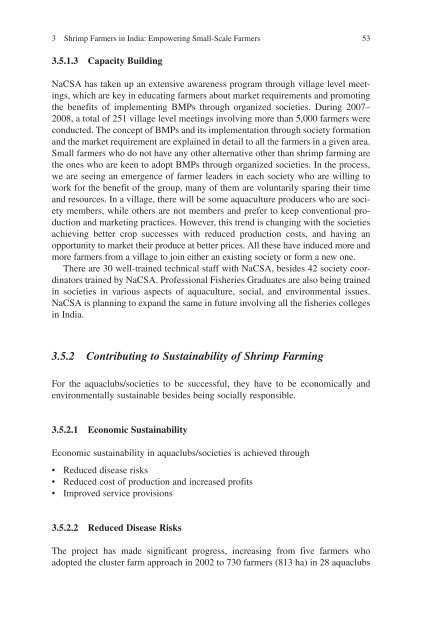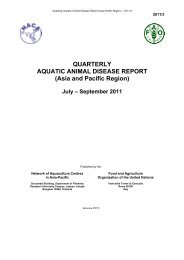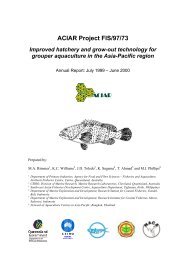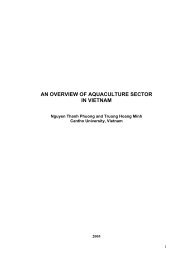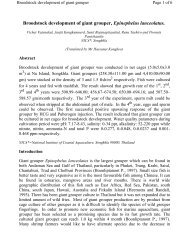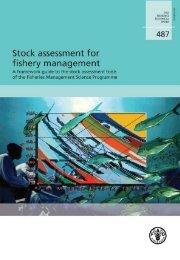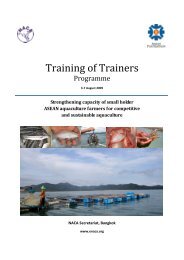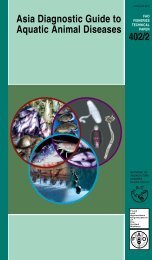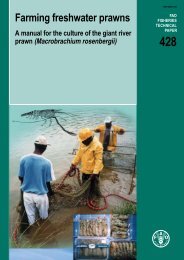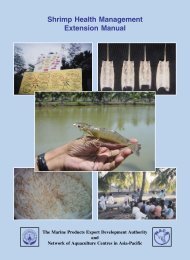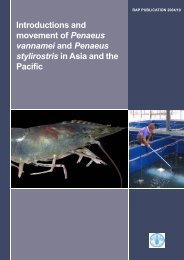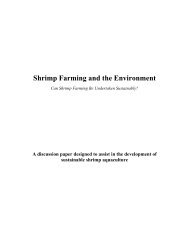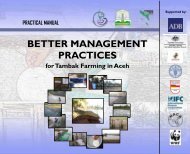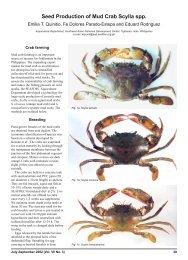Success Stories In Asian Aquaculture - Library - Network of ...
Success Stories In Asian Aquaculture - Library - Network of ...
Success Stories In Asian Aquaculture - Library - Network of ...
- No tags were found...
You also want an ePaper? Increase the reach of your titles
YUMPU automatically turns print PDFs into web optimized ePapers that Google loves.
3 Shrimp Farmers in <strong>In</strong>dia: Empowering Small-Scale Farmers533.5.1.3 Capacity BuildingNaCSA has taken up an extensive awareness program through village level meetings,which are key in educating farmers about market requirements and promotingthe benefits <strong>of</strong> implementing BMPs through organized societies. During 2007–2008, a total <strong>of</strong> 251 village level meetings involving more than 5,000 farmers wereconducted. The concept <strong>of</strong> BMPs and its implementation through society formationand the market requirement are explained in detail to all the farmers in a given area.Small farmers who do not have any other alternative other than shrimp farming arethe ones who are keen to adopt BMPs through organized societies. <strong>In</strong> the process,we are seeing an emergence <strong>of</strong> farmer leaders in each society who are willing towork for the benefit <strong>of</strong> the group, many <strong>of</strong> them are voluntarily sparing their timeand resources. <strong>In</strong> a village, there will be some aquaculture producers who are societymembers, while others are not members and prefer to keep conventional productionand marketing practices. However, this trend is changing with the societiesachieving better crop successes with reduced production costs, and having anopportunity to market their produce at better prices. All these have induced more andmore farmers from a village to join either an existing society or form a new one.There are 30 well-trained technical staff with NaCSA, besides 42 society coordinatorstrained by NaCSA. Pr<strong>of</strong>essional Fisheries Graduates are also being trainedin societies in various aspects <strong>of</strong> aquaculture, social, and environmental issues.NaCSA is planning to expand the same in future involving all the fisheries collegesin <strong>In</strong>dia.3.5.2 Contributing to Sustainability <strong>of</strong> Shrimp FarmingFor the aquaclubs/societies to be successful, they have to be economically andenvironmentally sustainable besides being socially responsible.3.5.2.1 Economic SustainabilityEconomic sustainability in aquaclubs/societies is achieved through• Reduced disease risks• Reduced cost <strong>of</strong> production and increased pr<strong>of</strong>its• Improved service provisions3.5.2.2 Reduced Disease RisksThe project has made significant progress, increasing from five farmers whoadopted the cluster farm approach in 2002 to 730 farmers (813 ha) in 28 aquaclubs


